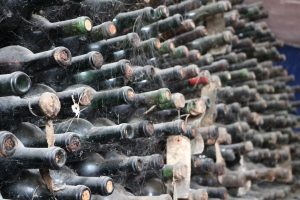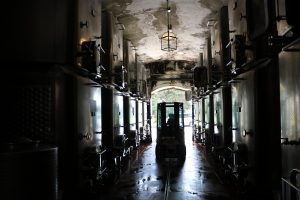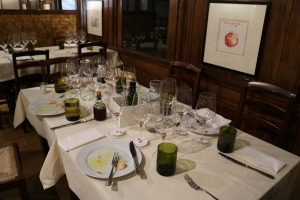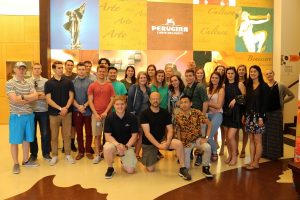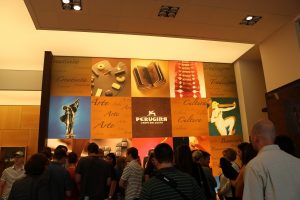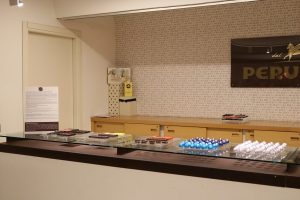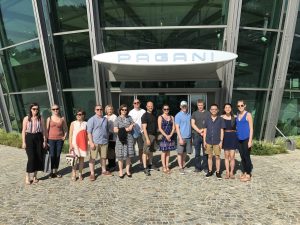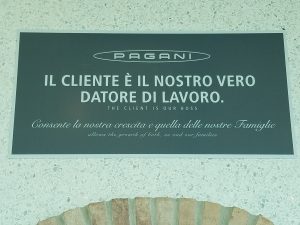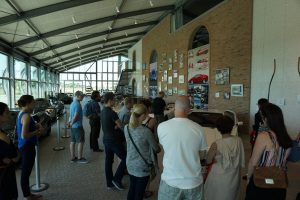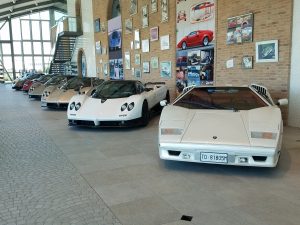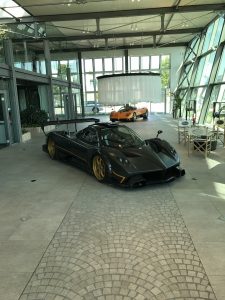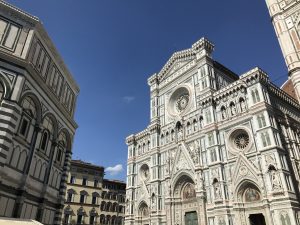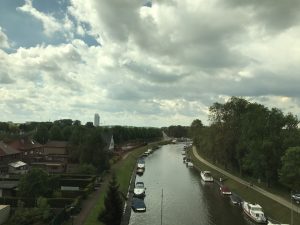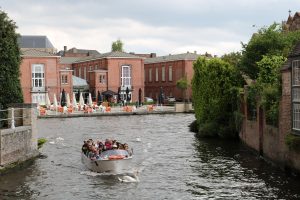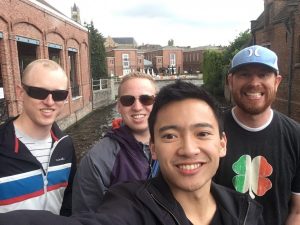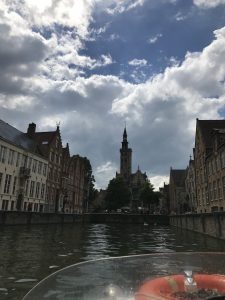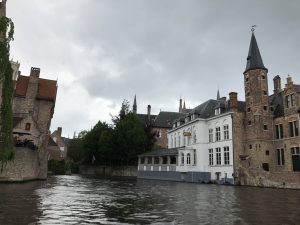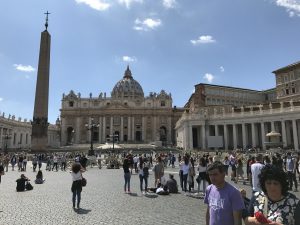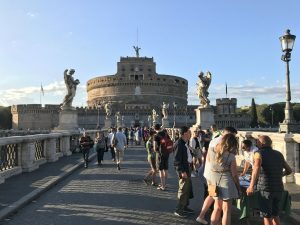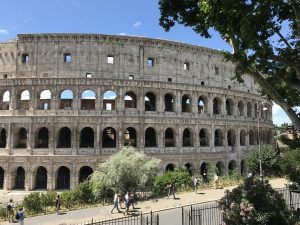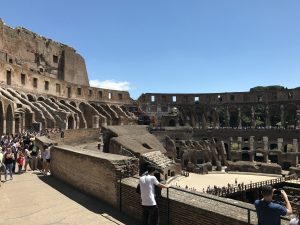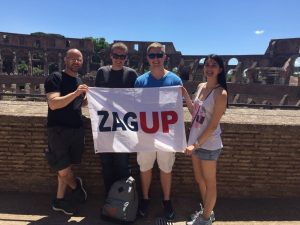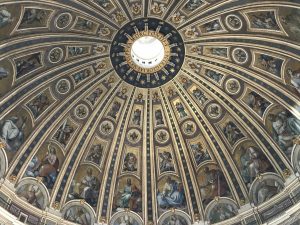Starting day three of our journey in Brussels, we shared another excellent breakfast here at the Wiltcher’s hotel (as well as some exceptional coffee). It was an earlier morning for us as our schedule had us arriving at the European Commission at 8:45. With the help of the concierge, we grabbed a few taxis and made our way to the Commission. After going through a security checkpoint, the host showed us to a lobby with an intricate timeline of the history of the European Commission which outlined the events that occurred within each presidency. Currently, the president of the commission is President Jean-Claude Juncker. The President is the head of the European Commission. According to the Treaties, he decides on the organisation of the Commission, allocates portfolios to members of the Commission and can make changes at any time. The President also determines the Commission’s policy agenda, defending the general European interest. The top ten priorities for the European Commission are: (1) jobs, growth and investment, (2) the digital single market, (3) energy union and climate, (4) internal market, (5) a deeper and fairer economic and monetary union, (6) a balanced EU-US fair trade agreement, (7) justice and fundamental rights, (8) migration, (9) a stronger global actor, and (10) democratic change.

European Commission
The first thoughts that came to our mind during the lecture at the Commission were about the difficulty in formation of the European Union. When we think of a strong unified union, we think of the United States. In the U.S. we take the fact that we have virtually no barriers to trade, employment, regulation, digital communication, language, or even qualifications when we move from state to state. The United States, however, was formed as a union from the start. It is difficult to get member states in the U.S. to agree on much. It must be extremely difficult to work with member states of the European Union as each have very different cultures, laws and language. According to the speakers at the Commission, the EU benchmarks themselves against the United States.

European Commission
When trying to mesh such a variety of cultures and political climates, compromise has to happen frequently. The EU still seems somewhat chaotic in terms of operating structure and maybe the political system wants too much sameness and likeness between member states. The member states all bring their own cultural features to the Union. The question we must ask then, is uniformity for the better? The Union is not based on a constitution, rather a set of treaties that work for peace between member states. We asked how the second speaker at the Commission saw himself. Did he see himself as a European or as an German? Are many European people’s still very nationalistic? The german speaker spoke about his perception of the union and how he, and the people he associates with, are all on the European spectrum of nationality rather than the “german” side. However, there are many people in the Union and many feel differently. A quote that was brought up by a group member was, “people will be more connected when the world does not tolerate other cultures, rather it takes delight in it.”
Our docent was the eminently qualified Mauro Galluccio, PhD. Dr. Galluccio modestly only hinted at his credentials in passing, mentioning his years of experience and involvement with European politics. However, according to his LinkedIn profile, he is a member of the European Association for Negotiation and Mediation, is both a political scientist and psychologist, an external speaker to the European Commission, a professional lecturer, and has been educated at Harvard Law School. He is the editor and author of four books, among them, the Handbook of International Negotiation. He speaks both fluent Italian and English (and I suspect, French.)

With Dr. Gallucci
Dr. Gallucci presented an overview and introduction to the formation, development, role, and limitations of the European Commission. The Commission is both national and supranational in construct, and must balance the tension between the two interests. There are ongoing challenges for the Commission, since the communications between the 28 member nations are dynamic and complex. On the issue of the number of member nations, 28, it’s conceded that the British “divorce” from the European Union (EU) is all but a foregone conclusion, merely working out the terms of final settlement in the remaining months of the two-years so that there will be, barring other new additions to the EU, only a projected 27 member nations. We also discussed that, while there are more nations that would like to join the EU, the process of acceptance is protracted and fraught and uncertainty.

With Dr. Gallucci (during the tour)
Since the European Commission makes political decisions that affect the member states, and more importantly, since all the nations have a long history and geographically speaking, an inseparable and inevitable relationship, the emphasis on negotiating in good faith with “no losers”, in Dr. Gallucci’s phrase, is paramount. “Help me,” Dr. Gallucci intoned, “Tomorrow, I help you.”
From its roots in the signing or the Treaties of Rome in 1957, the Commission has gone through tremendous cycles of growth, expansion, stress, contraction, and growth again. The future, from either an optimistic or pessimistic slant, as you might choose, would seem only to hold more of the same. Is this not the habitual nature of nations?
Overall, the visit to the Commission was very insightful and it was interesting to hear from our qualified speakers about their perception of the current state of the EU and where it is going. After visiting the European Parliament the day beforehand, we had a good background of the structure of the EU and who has the power to make decisions and the process that happens when a decision needs to be made. The Commission is like the “overseer” and mediator of the Union and its political entities. The talks were very well done and the German speaker gave us a quote at the beginning of his presentation, “It is difficult to fall in love with the European single market.” He said he would try and make us fall in love, and he was successful. The single market and the EU are amazing feats of peacemaking treaties and of the people of Europe. Doing business in Europe is much more efficient and sensible with the development of the EU. It seems like the first major step to a truly globalized world.

European Commission
Zaabar Chocolate Factory
Nestled in the heart of Brussels, is the Zaabar Chocolate Factory and store, founded in 2007, using a name inspired by the Spice Bazaar of Istanbul. The relevance of the name is best understood by sampling from a vast array of chocolates containing your choice of cinnamon, curry, lemongrass, cardamom, sesame, amaretto, lavender and violet, to name just a few!

Zabaar Chocolate Factory
In addition to watching a master chocolatier turn raw chocolate pastels into mouthwatering hand-dipped truffles and molded figures, we were introduced to the origin of dark, milk, and white chocolate. A video tour of cocoa pods being harvested also showed how the cocoa beans are extracted, fermented, and roasted before being ground into the more familiar cocoa powder. Each vast cocoa bean tree produces only 10-15 cocoa pods, and the picking process is all manual.

Zaabar distributes its chocolates in Europe, Japan, and Canada. As students of business, we are impressed with Zaabar’s marketing strategies to develop an interest in chocolate through hands-on experiences. Offerings include team-building workshops for companies, cocktail parties, private chocolate-making classes, school visits, and of course, ample tasting opportunities in the store! Ahhhhh…life is sweet in Belgium!
Written by,
Connie Lipsker & David Freet
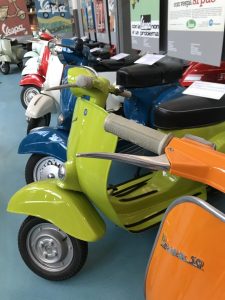
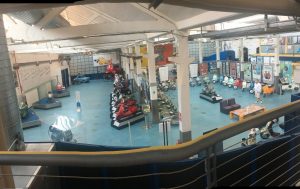
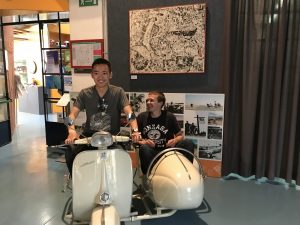
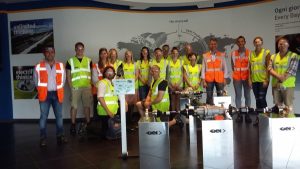

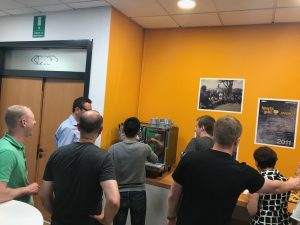


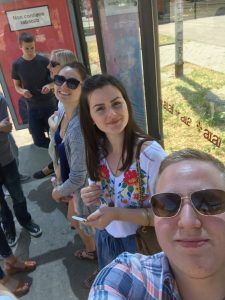 Zags at a bus stop
Zags at a bus stop 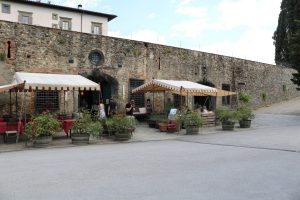
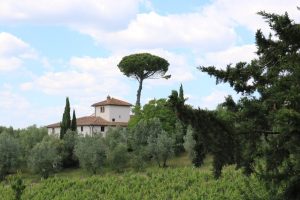
 Villa Le Corti Garden
Villa Le Corti Garden